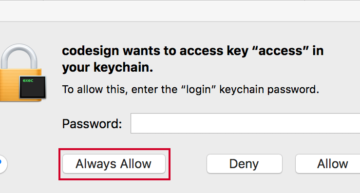
What Will Happen to Your Domains When You Die? 😳
Quick Summary of Contents
That’s a question every domain investor should answer without stammering and without fail. Whether we want to admit it or not, we’re all going to die! 😳
None of us will live forever, although our portfolio could likely continue until the end of time should a proper plan be in place to allow for such a thing to happen.
And because our domain portfolios could and will live on, don’t you think it’s worth all the time and money you’ve invested in ensuring your domain portfolio is managed well beyond death or disability?
There are a number of stories of lost domain portfolios due to the untimely death and disability of ill-prepared domain owners. 😲
Without planning, total strangers will eventually possess your domain names for pennies on the dollar. Let that sink in for a moment. 🤯
What Will Happen to Your Domains When You Die? Click To TweetI was reminded again of the great importance of domain estate planning and management as I read responses to one of my latest posts about a slew of “blockchain” domains expiring in an auction.
As I researched and published the post, at the time, it seemed quite foolish to have discovered such a large quantity of “blockchain” domains expiring.
After all, domains containing “coin”, “crypto”, “blockchain”, “chain”, and “block” are the top trending keywords for domain name registrations as of late (see Verisign Top Trending Keywords for December).
But as I would come to understand when reading responses, I never would have guessed that said “blockchain” domains had entered an expired auction due to the death of the owner. 🤭
The owner of this very lucrative “blockchain” domain portfolio, now splintered amongst a sea of domain investors, died unexpectedly in March 2017 while walking her dogs at the age of 50.
Watching a number of Jane’s previously owned “blockchain” close at or beyond 4-figure prices broke my heart for her and her family. Who knows, said domains could have been auctioned off for funds or kept as investments by loved ones.
But now, Jane’s diligently learned and perfected domain investing techniques and tactics over the years have vanished, likely due to no plan to execute or ill-advised plan execution. 😔
Let this be a reminder to us all that we, too, can become Jane should we not soundly plan for our domain portfolios to be managed beyond our death.
That said, several general estate planning attorneys can help establish a generic will to help protect your possessions. But what about protecting virtual accounts and assets?
If you or a close family member dies without a plan, you’ll likely have to contact companies to gain access to the virtual accounts.
As it pertains to domain names, most domain registrars provide a course of action should an account owner die.
For instance, GoDaddy provides an outlined process for what to do and how to gain access to domains/accounts after the owner’s death.
And although the steps are spelled out, it’s likely a highly complicated process that doesn’t ensure the success of account transfer from the deceased to the beneficiary or next of kin.
6 Aspects of Domain Estate Planning and Management.
Rather than taking a reactive stance as it pertains to domain estate planning and management, I encourage each of us to take the proactive stance, completing the following actions not limited too:
Develop relationships with industry professionals. This is a key step. I know there are many domain industry professionals who would come alongside other industry professionals’ beneficiaries to ensure the deceased owner’s domain portfolio is stewarded well and not taken advantage of.
Share and inform beneficiaries of domain dealings and account credentials. If nothing but a one-page plan of action, type up what beneficiary(ies) should do upon your death with domain dealings and accounts. Be sure also to include industry contacts and their respective contact information beneficiary may want to contact for guidance.
Associate a second email address to domain accounts. Ensure additional email addresses not associated with domains you own are associated with your account. If possible, associate beneficiary(ies) emails to the account as well. Also, be sure that email notifications are enabled.
Renew domains for multiple years. Try to renew domains for more than one year to buy beneficiary(ies) enough time to plan and act accordingly. Personally, certain I renew certain domains for 5 and 10-year periods. In addition, I recommend using shared credit card accounts or bank accounts for domain renewals.
Safely store and update online account credentials offline AT ALL TIMES, preferably in a shared bank deposit box. List ALL account details and credentials from A to Z, including the action plan (see second bullet). Leave no rock unturned. Better safe than sorry on this one. Another thing to note is whether the accounts have two-step or two-factor authentication associated with the account. This could pose a problem if the deceased person’s phone is no longer active. 😉
Have an attorney prepare a will. A quick search yielded a list of attorneys specializing in domain name legal issues, agreements, and disputes. Note that the list doesn’t specifically state estate planning, but I would consider it a good starting point, seeing domain names are their specialty and expertise.
6 Aspects of Sound Domain Estate Planning and Management Click To TweetThe aforementioned list of actions is not exhaustive, yet it should be used as a starting point. In fact, I was hoping there was a domain estate planning and management service of some sort.
I mean, it’s been decades since the birth of the Internet. There have to be ICANN-accredited domain registrars or companies offering domain-centric estate planning services to persons investing in domain names, right? 🤔
Well, performing a quick search online, I stumbled upon a domain-name inheritance planning service offered by DomainMart.com.
Of course, the press release is closing in fast on 15 years of age. So, I’m not exactly sure if DomainMart.com is a current and viable option. The page mentioned in the press release currently resolves as a 404 error page.
While reading up on DomainMart.com, I then remembered there was a service launched about 6-7 years ago designed to technically and legally protect and manage domain assets in the event of a domain portfolio owner’s death or disability: DomainGuardians.com.
I don’t recall whether or not the Domain Guardians’ Domain Legacy service is active today, but it’s certainly a concept worth considering.
The aforementioned companies were the only two options that surfaced when searching for domain estate planning and management services. There may be additional service offerings available that I’m not aware of. 🤔
Does your domain portfolio have a life-after-death plan? Click To TweetClosing Thoughts
In closing, we’re all diligently learning and perfecting domain investing techniques and tactics as the days, months, and years pass on.
But with this same energy, let’s tirelessly and prudently act to plan for the inescapable exit of death by fortifying the stewardship of a domain portfolio and legacy with sound domain estate planning and management.














